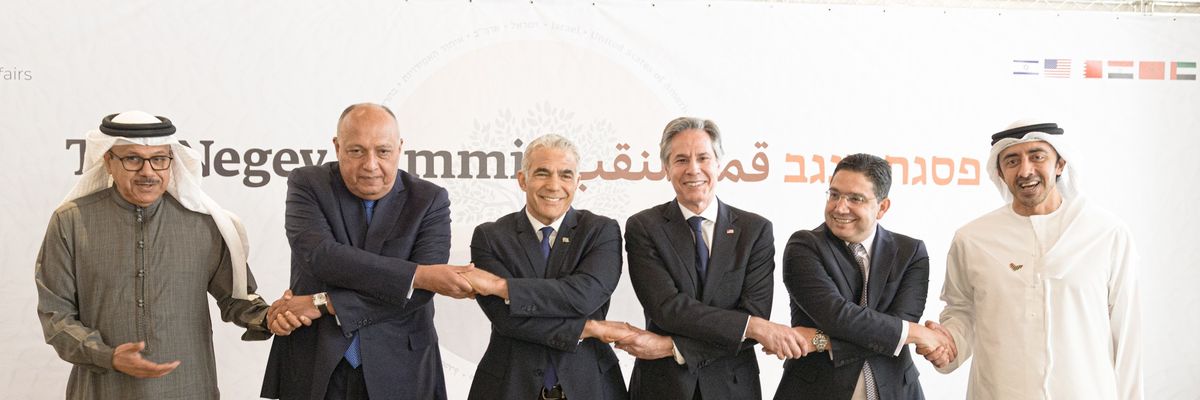A straightforward message emerged from this week’s meeting in the Negev desert of the foreign ministers of four Arab countries, Israel and the United States: Israel is key to the security of Gulf autocracies and continued US engagement in the Middle East.
It may be a message that on the surface holds out the promise of reduced regional tension, the beginning of a rejiggering of the region’s security architecture, and the Middle East’s increased ability to fend for itself increasingly.
A look under the hood suggests that there may be less to the façade the foreign ministers of the United Arab Emirates, Egypt, Bahrain, Morocco, Israel, and the United States are erecting.
What emerges from the lifting of the hood is that Gulf states, including the UAE, once described as ‘Little Sparta’ by former US Defence Secretary Jim Mattis because of its military prowess, are unable to defend themselves against external threats despite being among the world’s foremost buyers of the most sophisticated weaponry.
They are also less likely than Israel to keep the United States engaged in the Middle East when Washington sees its critical national security challenges elsewhere.
The UAE, like Saudi Arabia, has yet to launch a successful foreign military venture or successfully impregnate its territory against attacks by foreign adversaries. The UAE partially withdrew from the seven-year-old Yemen war without achieving its military objectives despite leaving local proxies behind, while Saudi Arabia is looking for a face-saving end to the conflict.
The Saudi-led coalition on Tuesday declared a one-month ceasefire during the holy month of Ramadan during a summit of the leaders of the Gulf Cooperation Council that groups Saudi Arabia, the UAE, Bahrain, Kuwait, Qatar and Oman. Yemen’s Houthi rebels refused to join the meeting because it was held in Riyadh, the capital of one of the war’s main protagonists.
Meanwhile, the two Gulf states have been unable to protect their infrastructure and oil facilities from missile and drone attacks by the rebels and potentially by Iran itself.
Israel’s importance to the Arab states was highlighted by the fact that the first-ever such gathering, particularly on Israeli soil, was convened by the Jewish state rather than the UAE, for example, and held in the home of David Ben Gurion, a founder and the first prime minister of Israel.
To be sure, the Ukraine crisis has brought the Middle East’s significance back to the fore, whether it relates to the diversification of the supply of oil and gas to Europe, the Middle East’s impact on security beyond its borders, or stability in an era of defiance and dissent with the rise of the spectre of food riots in various Middle Eastern countries because of a spike in commodity prices.
By agreeing to attend a gathering in the home kibbutz of Mr. Ben Gurion, whom Palestinians hold co-responsible for their plight, Arab foreign ministers were further underlining Israeli power in the region.
They also ignored the fact that the series of killings in recent days of Israelis by apparent Palestinian lone wolves suggests that the Palestinians are as much part of Israel and the region's security equation as is Iran, the Houthis, or Lebanon's Shiite militia-cum-political party, Hezbollah.
The killings occurred on the eve of a month of major religious Muslim, Jewish, and Christian holidays that could spark emotions at sensitive sacred sites in Jerusalem.
Moreover, the Palestinians and others will have noted that at a time when Russia's invasion of Ukraine dominates headlines, three of the six participants in the summit – Israel, the UAE, and Morocco – occupy foreign lands and/or have intervened militarily in conflicts beyond their borders.
King Abdullah of Jordan, together with Sudan, the two other Arab countries that have recognized Israel, made a point of visiting Palestinian President Mahmoud Abbas in Ramallah on the West Bank on the day of the summit rather than joining the gathering. Israel conquered the West Bank during the 1967 Middle East war.
Israel’s importance is not simply its military and technological prowess and its ability and willingness, in contrast to the United States, to confront Iran in Iran itself as well as in Syria and cyberspace, but also that it is the only Middle Eastern country that can boast a significant grassroots popular base in the United States.
That gives Israel the kind of sway in Washington that cannot be obtained by spending millions of dollars on the services of public relations and lobbying firms.
It also means that amid the suggestion that the United States may be reducing its commitment to the Middle East to better focus on the Indo-Pacific and Europe in the wake of Ukraine, Israel is the one regional state that will retain Washington's full attention.
As a result, Israel is increasingly likely to play a part, and already frequently has, not only in regional security but in relations between the United States and various Arab states on multiple issues, including arms sales.
“Ben-Gurion would have been proud that, given Arab perceptions that the US is engaged in retrenching in the Mideast, it is Israel being welcomed by key Arab states, expanding its regional profile and at least partly filling that void,” said Washington Institute for Near East Policy analyst and former US official David Makovsky.
This article has been republished with permission from James M. Dorsey.
















